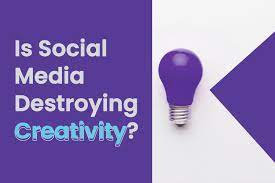The impact of social media on creativity is a topic of ongoing debate. While social media platforms offer opportunities for creative expression, networking, and inspiration, they also present challenges that can potentially hinder creativity.
Here are some ways in which social media might affect creativity:
Exposure to diverse ideas: Social media can expose users to a wide range of ideas, perspectives, and creative works from around the world, which can inspire and stimulate creativity.
Networking and collaboration: Social media platforms allow creatives to connect with others in their field, collaborate on projects, and receive feedback on their work, fostering a sense of community and collective creativity.
Instant feedback: Social media provides instant feedback on creative work, allowing individuals to gauge audience reactions and adjust their approach accordingly. However, this can also lead to a focus on creating content that is more likely to garner likes and shares rather than genuinely innovative or original work.
Comparison and pressure: The constant stream of content on social media can lead to feelings of inadequacy and pressure to measure up to perceived standards of success, potentially stifling creativity.
Distraction: Spending excessive time on social media can detract from focused, deep thinking and creative exploration. The constant notifications, scrolling, and multitasking can disrupt the flow of creativity.
Filter bubbles: Social media algorithms often prioritize content that aligns with users' existing interests and viewpoints, potentially limiting exposure to new ideas and stifling creativity.
Whether social media enhances or diminishes creativity likely depends on how individuals use it and the broader cultural and social context. While social media can be a valuable tool for creative expression and connection, it's important for users to be mindful of its potential pitfalls and to cultivate habits that support their creative process.
Here are some ways in which social media might affect creativity:
Exposure to diverse ideas: Social media can expose users to a wide range of ideas, perspectives, and creative works from around the world, which can inspire and stimulate creativity.
Networking and collaboration: Social media platforms allow creatives to connect with others in their field, collaborate on projects, and receive feedback on their work, fostering a sense of community and collective creativity.
Instant feedback: Social media provides instant feedback on creative work, allowing individuals to gauge audience reactions and adjust their approach accordingly. However, this can also lead to a focus on creating content that is more likely to garner likes and shares rather than genuinely innovative or original work.
Comparison and pressure: The constant stream of content on social media can lead to feelings of inadequacy and pressure to measure up to perceived standards of success, potentially stifling creativity.
Distraction: Spending excessive time on social media can detract from focused, deep thinking and creative exploration. The constant notifications, scrolling, and multitasking can disrupt the flow of creativity.
Filter bubbles: Social media algorithms often prioritize content that aligns with users' existing interests and viewpoints, potentially limiting exposure to new ideas and stifling creativity.
Whether social media enhances or diminishes creativity likely depends on how individuals use it and the broader cultural and social context. While social media can be a valuable tool for creative expression and connection, it's important for users to be mindful of its potential pitfalls and to cultivate habits that support their creative process.
